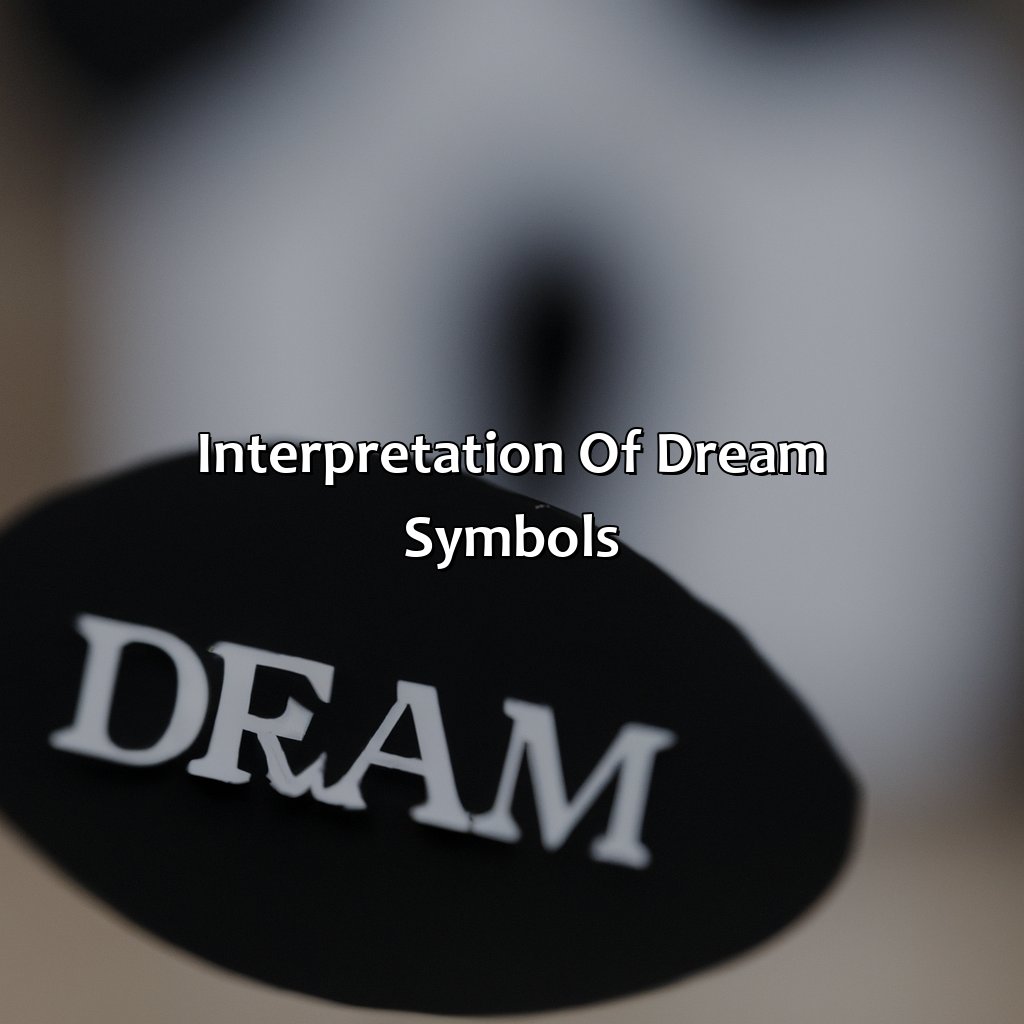Key Takeaway:
- Dreams have a symbolic language that colors can represent certain meanings. The color black in dreams can symbolize the unknown or hidden aspects of one’s self or the world around them.
- Dream analysis can help understand the symbolism in dreams, including the meanings of common symbols and the role of both personal experiences and cultural and historical contexts in dream interpretation.
- The symbolism of the color black in dreams can have both negative and positive connotations depending on the context. Negative interpretations can include fear, grief, or loss, while positive interpretations can include mystery, power, and potential for growth.
Meaning of the Color Black in Dreams

Photo Credits: colorscombo.com by Ronald Walker
The color black in dreams has significant meaning and symbolism. In understanding dream interpretation, the color black is often associated with the subconscious mind, hidden thoughts, and mystery. Black color in dreams often represents fear, anxiety, and negativity. It can indicate the need for greater awareness and acceptance of oneself.
Furthermore, the color black in dreams may also represent transformation and rebirth. It often signifies the end of one phase of life and the beginning of another. Black color in dreams can also indicate a desire for power or control, or the need to confront one’s fears and face the unknown.
It is worth noting, however, that the meaning of the color black in dreams may vary depending on the individual’s cultural or personal associations with the color. It is essential to consider the context and personal relevance of the dream in interpreting its meaning.
Interpretation of Dream Symbols

Photo Credits: colorscombo.com by Andrew Gonzalez
Interpreting dreams has potential if you know the meanings of dream symbols. To help with this, check out the Interpretation of Dream Symbols section. It has a sub-section titled: “What does the color black mean in a dream“. This section explains the importance of symbolism in dreams, and offers common dream symbols and their meanings.
The Importance of Symbolism in Dreams
The use of symbolism in dreams is significant for interpreting the meaning behind them. Dreams often present themselves as a form of symbolism that can be interpreted to unravel the underlying emotions, thoughts and experiences. Symbolism helps in unlocking multiple interpretations and layers of meaning that hide beneath the surface. The importance of symbolism lies in its ability to convey deeper meanings that cannot be described explicitly by words alone.
Symbolism in dreams carries immense significance as it highlights the hidden aspects of our psyche, including repressed feelings and desires. The symbols utilized in dreams are not random but represent specific concepts designed to convey a message to us, whether it’s related to our past experiences or future events we are likely to encounter. By understanding the symbolic language presented by our subconscious, we are better equipped to uncover insights into our inner selves.
The aspect of symbolism never gets old as each person has their unique perspective on different symbols; hence interpretations vary depending on an individual’s values and belief system. Understanding how each symbol shows up throughout one’s life experience could prove helpful when deciphering messages found within dreams.
To better understand one’s symbolic language, keeping a dream journal can be beneficial. Writing down all the details about your dreams can help analyze them later with less contamination from your conscious mind’s thoughts regarding what happened during sleep mode.
Get ready to decode your dreams like a detective as we uncover the meanings behind common dream symbols.
Common Dream Symbols and Their Meanings
Dreams use a variety of common symbols to communicate deep meanings. Understanding the meanings of these symbols is vital in interpreting dreams. Some common symbols include animals, objects or events. When interpreted correctly, these symbols provide a glimpse into one’s unconscious thoughts and emotions.
In dreams, the meaning behind certain symbols can differ from their everyday connotations. For example, dreaming about snakes is often seen as negatively symbolic, representing fear or danger. On the other hand, dreaming about flying cats might seem odd but could represent confidence and overcoming obstacles.
Commonly seen symbols such as water or fire can also hold significant meanings. For instance, water may symbolize renewal and change while fire often represents passion and transformation.
It is crucial to understand that dream symbolism differs for each individual; experiences and beliefs play an essential part in this interpretation process. Therefore, it’s essential to reflect on what specific things mean to oneself rather than relying on general interpretations from external sources.
I recall my own experience having a vivid dream about losing my teeth. I researched online and found that numerous sources mention it related to anxiety or insecurity. However, upon reflection of my personal life circumstances at that time and evaluating how it affected me personally, I realized it represented communication issues with close friends.
Well, if you dream of the color black, it could either mean you’re feeling empowered or just running low on laundry detergent.
Symbolism of the Color Black

Photo Credits: colorscombo.com by Nathan Adams
Grasp the significance of black in your dream. Delve into the symbolism of black. The color black has both positive and negative meanings. To understand your dreams, think of its gloomy connotations such as darkness and death. Also, don’t forget its positive symbols like mystery and authority.
Negative Connotations of the Color Black
The color black in dreams is often associated with negative connotations due to its common symbolic meanings. Black can represent death, mourning, darkness, fear, and the unknown. It can also be interpreted as a warning sign for danger or failure. Dreams featuring the color black may indicate feelings of sadness, depression, or pessimism.
Black color’s negative connotations stem from cultural and historical contexts which associate it with evil and negativity. In Western cultures, the color is often associated with death and mourning attire. Its association with dark magic further solidifies this connection to negativity.
Additionally, the psychological interpretation of dreams suggests that black can symbolize one’s suppressed emotions or aspects of their personality that are hidden from themselves or others. The color’s foreboding nature adds to its negative meaning when it appears in a dream.
Pro Tip: The context of the dream and personal experiences should also be taken into account when interpreting the meaning behind the color black in dreams. Keeping a dream journal and reflecting on the emotional tone of the dream can provide valuable insight into any underlying emotions or issues that need attention.
Who says you can’t wear black to a wedding? In your dreams, it might mean acceptance and renewal.
Positive Connotations of the Color Black
The color black has some positive connotations in dream symbolism. Black represents the unconscious mind and can signify that something hidden or unknown is about to be unveiled. It can also represent strength and power, as well as sophistication and elegance.
In dreams, wearing black clothing can represent authority and professionalism. It can also symbolize a desire for change or transformation, as black is often associated with new beginnings. Additionally, black animals such as cats and ravens are often seen as mystical or magical creatures, representing intuition and wisdom.
Furthermore, in many cultures around the world, the color black is associated with mourning and grief. However, in some cultures, it is a symbol of luck or good fortune. For example, in Japanese culture, the color black is associated with honor and respect.
It’s important to remember that dream interpretation is highly subjective and can vary greatly depending on personal experiences and cultural contexts. However, by keeping a dream journal and reflecting on the emotions present in the dream, we can gain deeper insight into our subconscious thoughts and emotions.
Historically speaking, the positive connotations of black date back to ancient Egypt where it was believed to symbolize fertility and rebirth due to its association with fertile soil along the Nile river banks. In ancient Greek culture, it represented intellect and knowledge due to the clothing worn by scholars being predominantly black.
Exploring the complexities of our psyche through dream interpretation is like playing therapist to ourselves in our sleep.
Psychological Interpretation of Dreams

Photo Credits: colorscombo.com by Richard White
Do you need to explore the psychological meaning of black in a dream? This section is perfect for you!
Here, you’ll learn to interpret dreams, including conscious and unconscious thoughts and emotions. Dream analysis can help self-discovery and growth, and this section will show you how.
How Dreams Reflect One’s Conscious and Unconscious Thoughts and Emotions
Dreams have the ability to reflect both conscious and unconscious thoughts, emotions, and reflections that a person may have. Our perceptions of the world are tied to our mental state, which is influenced by these same thoughts, feelings, and experiences we encounter daily. Dreams serve as a vehicle for processing these experiences and emotions that are present within us.
As we sleep, dreams offer an insight into the things that are weighing heavily on our minds or may have gone unnoticed before. They can bring latent thoughts to our attention, and this alone can be useful in identifying areas of growth or healing in one’s personal life. Through exploring dreams and dreaming patterns over time, people can gain a greater understanding of their internal world.
Factors such as cultural background, belief systems, social relationships and personal traumas influence what one might dream about. Thus each person’s dream interpretation has personalized meaning depending on the aforementioned factors and more.
Reflecting on dreams via journal entries aids in contextualizing recurring themes found within random flashbacks or highly detailed scenarios experienced while asleep. Another method involves focusing on emotions present in dreams because often they mirror realities within waking-life situations also impacted by those same feelings.
Dream analysis: because sometimes the only way to truly know yourself is to see what your subconscious mind is up to.
The Role of Dream Analysis in Self-Discovery and Personal Growth
Dream analysis plays a significant role in the process of self-discovery and personal growth. By examining the symbols and themes that recur in dreams, individuals can gain insight into their subconscious thoughts and emotions. This can help uncover hidden fears, desires, and motivations that may be impacting one’s daily life. Dream analysis serves as a tool for gaining a deeper understanding of oneself, leading to greater self-awareness and personal growth.
Through dream analysis, individuals can explore their innermost thoughts without judgment or censorship. This allows them to connect with their true feelings and reflect on experiences they may not have fully processed when awake. It also provides an opportunity to challenge limiting beliefs or negative thought patterns by identifying recurring themes or symbols and exploring alternative interpretations.
To effectively analyze dreams, it is essential to keep an open mind and approach the process with curiosity rather than skepticism. It is also important to consider the context in which the dream occurred, including personal experiences and beliefs as well as cultural and historical factors that may have influenced it.
To enhance one’s dream analysis practice, keeping a dream journal is recommended. Writing down dreams immediately upon waking can help capture details that might otherwise be forgotten and provide a record of recurring themes over time. Reflecting on the emotional tone of the dream rather than just literal interpretations can also uncover deeper meaning.
In summary, dream analysis offers individuals valuable insights into their subconscious thoughts and emotions, aiding in self-discovery and personal growth. By exploring recurring symbols and themes within dreams through different perspectives without censorship or judgment helps identify hidden fears or desires impacting daily life. Incorporating tips such as keeping a journal while analyzing could assist in this journey towards better understanding oneself.
Dream interpretation, like fashion, is influenced by personal tastes and cultural shifts – thankfully, bell-bottoms aren’t making a comeback in the dream world.
Factors that Influence the Interpretation of Dreams

Photo Credits: colorscombo.com by Matthew Torres
To interpret dreams, multiple elements must be taken into account. The color black in a dream can have various meanings. Personal experiences, beliefs, cultural and historical contexts all affect the meaning of dream symbols. Thus, these are important to consider when analyzing dream symbols.
Personal Experiences and Beliefs
The Interpretation of Dreams can often be influenced by Personal Experiences and Beliefs. The way individuals perceive symbols in their dreams can vary based on their experiences, cultural background, religious beliefs, and personal values. These factors also play a vital role in how one interprets the color black in their dreams.
It is essential to approach dream analysis with an open mind and acknowledge that different interpretations can exist depending on the individual’s personal experiences and beliefs.
It is crucial to understand that some individuals may have preconceived notions about certain symbols or colors based on their culture or upbringing. For instance, some cultures associate black with death and mourning, while others view it as a symbol of elegance and power. When interpreting the color black in dreams, it is crucial to consider these cultural differences and how they can shape one’s perception.
Furthermore, past traumas or experiences can influence how an individual interprets symbols in their dreams. Suppose someone has experienced a negative event involving the color black, such as losing a loved one. In that case, they may associate this color with grief or sadness when it appears in their dreams.
To overcome these biases, one must keep an open mind while interpreting dream symbolism. By acknowledging that personal experiences and beliefs can affect dream interpretation, individuals can avoid taking any predefined meanings as set-in-stone. They should also analyze each symbol individually and reflect on how it pertains to them personally.
Keeping a Dream Journal is another effective means of understanding how one’s personal experiences affect dream interpretation. By recording every detail of their dream immediately after waking up, individuals can gain insight into what symbols resonated with them the most emotionally. Reflecting on these emotions will help uncover subconscious thoughts and patterns related to personal experiences and beliefs.
In Conclusion, when interpreting dreams or any symbolism associated with them, it is essential to remain open-minded towards other perspectives since perspective varies across societies due to differences in beliefs among people who communicate differently; hence, there exist interpretations with biases. When done right, dream analysis can help individuals unlock their subconscious to gain a deeper understanding of themselves and achieve personal growth.
A dream about the color black in ancient Egypt might mean a new age of pharaoh-chic fashion is upon us.
Cultural and Historical Contexts
Cultural and historical contexts are pivotal in dream interpretation. The cultural beliefs, values, and practices of individuals influence their dream symbols and imagery. Similarly, previous experiences and socio-political events can impact dream interpretations. Understanding the cultural backgrounds and historical contexts of dreamers play a major role in comprehending their dreams.
The significance of cultural contexts is exemplified by the concepts of “collectivism” and “individualism.” In collectivistic cultures, dreams might focus on familial or community issues, while individualistic cultures may involve personal aspirations or achievements. Historical contexts can also impact dream analyses as attested by the recurrent appearance of war themes in post-war societies’ dreams.
It is important to note that historical events like slavery or colonization can shape an individual’s subconscious mind leading to a different interpretation of their dreams compared to those who have not experienced these periods.
Interpreting one’s dreams through cultural and historical lenses may provide deeper insights into one’s unconscious mind. Dream interpreters must be well versed in varying perspectives when assessing a person’s dream symbols.
Don’t miss out on understanding your own frequent symbolism patterns by disregarding cultural and historical contexts. Trusting your intuition on interpreting your dreams doesn’t always lead to accurate interpretations, however cross-checking with the aforementioned factors gives you a better chance at understanding what it means behind the symbolisms within your fantasies.
Unlock the hidden meanings of your dreams by keeping a dream journal and honing your skills in dream interpretation with these helpful tips.
Tips for Interpreting Dreams

Photo Credits: colorscombo.com by Larry Thompson
For better dream interpretation, use the tips in the ‘Tips for Interpreting Dreams’ section of the article ‘What does the color black mean in a dream’.
- Keep a dream journal to help you remember.
- Think about the emotional tone of your dream. This will help you discover the hidden messages of your subconscious mind.
Keeping a Dream Journal
Recording and documenting dreams in a journal is an effective method of keeping track of one’s subconscious thoughts and feelings. Consistently updating the dream journal allows for better understanding of recurring patterns or symbols in dreams, leading to a more accurate analysis. Keeping a dream journal helps in maintaining data relevant to each experience that may seem insignificant, making it easier to decode the meanings hidden behind certain symbols. Documenting the occurrences as soon as one wakes up increases precision by reducing errors or forgotten details in record-keeping.
Incorporating record-keeping into daily routine assists in developing a keen sense of self-awareness as well as an improved ability to understand and decipher the unconscious messages conveyed through dreams. Consecutively, it is essential to be organized when recording dreams by using clear and concise language to describe what was seen or felt during each individual occurrence properly. These records also prove helpful while seeking professional guidance from psychologists or psychoanalysts.
A dream journal is not limited solely to personal analysis and interpretation; rather, it can serve as future reference material for researchers on psychological interpretations of dreams. It can become an essential asset for people interested in taking advantage of their subconscious mind’s power for self-growth and exploration.
According to psychologytoday.com, “Keeping dream records enables you to see changes over time, including emerging patterns and motifs which would otherwise have gone unnoticed” (Pagel 2018).
Your emotional tone in a dream could be more revealing than a cheap therapist, so reflect wisely.
Reflecting on the Emotional Tone of the Dream
Reflecting on the emotional tone of a dream is vital when interpreting its possible symbolism. The emotional tone reveals the dreamer’s innermost feelings and the significance of events that occur in the dream. By analyzing emotions felt during a dream, one can gain insight into what their subconscious may be communicating. Understanding the emotional tone allows one to identify any repressed emotions or fears they have yet to confront.
Additionally, analyzing the emotional tone of dreams enables individuals to acknowledge and process any unresolved issues that may be affecting their lives consciously or unconsciously. In this reflection, one recognizes key themes, conflicts, and motivations experienced within the dream state.
A tip for reflecting on emotional tones in dreams is to pay attention to recurring themes or symbols that produce intense emotions. Dedicating time to reflect on these aspects of a dream can result in discovering life-changing meanings and personal growth opportunities that would be difficult to recognize otherwise.
Five Facts about What Does the Color Black Mean in a Dream:
- ✅ The color black in a dream often represents mystery, secrecy, and the unknown. (Source: Dream Dictionary)
- ✅ Black can also symbolize death, mourning, and grief in a dream. (Source: World Dream Bank)
- ✅ In some cultures, black is associated with power, strength, and elegance in a dream. (Source: Exemplore)
- ✅ Black can also indicate negativity, fear, and depression in a dream. (Source: Dream Stop)
- ✅ Wearing black in a dream may suggest a need for protection or a desire to blend in. (Source: Dreaming and Sleeping)
FAQs about What Does The Color Black Mean In A Dream
What does the color black mean in a dream?
Many different interpretations exist about what the color black can signify in a dream. It often represents death, mystery, fear, or negativity, although it can also symbolize things like power and sophistication. The specific meaning depends on the details of the dream, such as the setting, other objects or people present, and the emotions felt by the dreamer.
Does dreaming of black mean that something bad is going to happen?
Not necessarily. While black can represent negative things like fear or uncertainty, it can also symbolize power and protection. The context of the dream is important to consider, and it’s also important to remember that dreams are not always prophetic or literal.
What does it mean to dream of a black cat?
In some cultures, black cats are associated with bad luck or witchcraft, so dreaming of a black cat might suggest negative energy or danger. However, in other cultures, black cats are seen as good luck or even a symbol of femininity. The interpretation depends on the individual dreamer’s cultural background and personal associations with cats.
Is black always a negative color in dreams?
No, black can have positive connotations as well. For example, a dream of wearing a stylish black outfit might symbolize confidence or elegance. The context of the dream and the individual dreamer’s associations with black will help determine what kind of symbolism is at play.
What is the meaning of a dream in which everything is black?
Dreaming of an entirely black void or darkness can be a sign of depression or anxiety. It might also represent a fear of the unknown or a feeling of being lost. However, it can also represent the birth of a new idea or project, since black can signify the unknown or the potential for growth.
What do repeated dreams of black signify?
If a person has multiple dreams in which black is a prominent feature, it might signify an ongoing feeling of negativity or powerlessness in their waking life. It’s important to pay attention to the details of the dreams and to consider seeking therapy or counseling if the dreams are causing distress or interfering with daily life.





